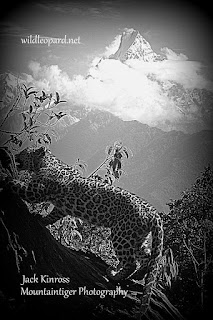Leopards are secretive, very hard to see in the wild. I've not sure how many leopards I've seen but because of the nature of what I do many of them have been dead. There have been also been injured and orphaned individuals. Wild tigers are more visible, still a captivating sight but not one I seek, I hate disturbing wildlife unnecessarily. Snow leopards leave sign, I come across this when researching forest leopards at higher altitude and at a kill site it takes a bit of work to understand which of these leopards has performed the hunt.
Writing a book gives the benefit of being even more thorough when working through information. Running a conservation organization and trying to fund it through selling photographs is like working three jobs. The book writing helps me though, it lets me seek perspective deeply. As soon as I finish this first one I know I'll plunge straight into the next one because the process helps everything else.
Sleep? You're kidding right...
I'm continually been presented with information. Not many people have my phone number, I prefer to converse through the several inboxes we all have now. The phone is for the serious stuff and it beeps at me too often anyway. Late last night it beeped again, another leopard case...
So I was up early this morning verifying information. It now means adjusting plans, dealing with the fluidity of the situation. It's why I'm now posting a very brief version of a longer piece for my book. The continual search for truth is not easy, there is the veneer of smiles and politeness to look at when you know you are being fed bullshit by way too many. The years have taught me how to deal with these people. Just get it over with and move on, try and find something, someone genuine.
As well as that there are many different perceptions from those who are genuine in their concern for the future of the great cats of Asia. A tourist wants to see a tiger without understanding that it is often counter-productive to do so, that habituating that tiger to even more human presence may eventually endanger a villager. A villager tells of a leopard living nearby, the man or woman is sure it is eating his or her goats and chickens yet investigations show it's not a leopard, it's a civet or a dog, something else but the leopard gets blamed... and yes, it is sometimes involved as well An academic bases his presentations on sketchy research involving out of date methodology, yet the audience still buys the words, everyone goes home happy, job well done... once again I use the term, "yeah right".
Every day social media shows up thousands of endearing great cat images. People go aaawwwwww, how beautiful. The family that has just had livestock taken by these calculating killer cats thinks differently. The family that has one of their own killed by a great cat, that family never stops crying.
We blame China. China turns round and says you are hypocrites, look what you've done to your wildlife, clean up your own mess. Every day hundreds and thousands of petitions get signed, they go nowhere. The talk goes on, politicians pontificate, the outraged culture satisfies its hunger to be outraged and we verbalize our way through another day. Humans, we talk a big game... but poaching and illegal wildlife trade feeding a global market continue to grow.
Thus at ground level the problems continue and get worse. There are small gains but overall we're losing. A young recently graduated wildlife biologist, top of her class, says to me with deep concern in her eyes, "Jack, so much is not working yet the world keeps repeating the mistakes"... my reply is simply that perceptions have to change or we will lose these great cats.
Here in Nepal right now we're trying. I'm going to launch a massive image selling campaign shortly to maintain our efforts. Anti-poaching and human/wildlife conflict mitigation are the tasks with the leopard rewilding program an important emphasis within the Leopard Task Force about which information will be published in a couple of days at
wildleopard.net as well as upcoming changes at
wildtiger.org. We need people to seriously examine their perceptions and support levels. I'm going to use Asa, the Leopard of Hope, as a figurehead, that young leopard taught me so much and has strengthened my resolve even further.
But if perceptions aren't changed quickly, yes, as Bidhya and I mentioned the other day, we will lose these great cats. We'll be confronting many more images like the one I posted here unless there is commitment by humanity followed by action, not just talk. There is only one perception right now that is accurate, that is that the days of the great cats of Asia are numbered if things keep going the way they are.
This post (and other updates) are available at
Facebook if you wish to comment.
.




















